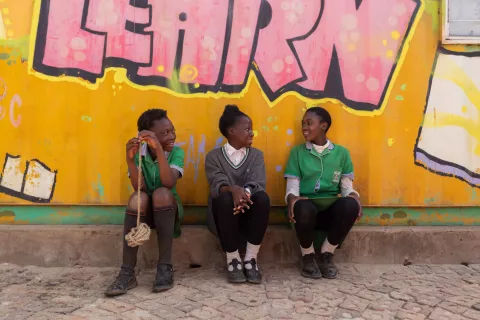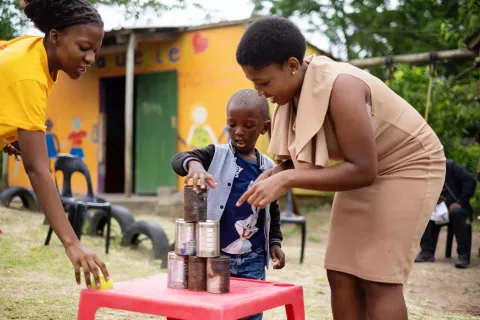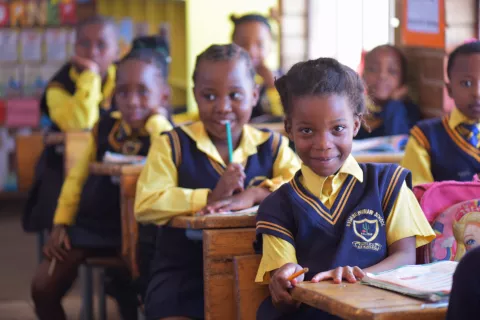Care and support for teaching and learning
UNICEF and MIET working to leave no child behind

Funjwa Primary School is located on the outskirts of the town of Hoedspruit, bordering South Africa’s iconic Kruger National Park. Humid and lush vegetation characterise this part of the country, known as the ‘lowveld’ as is evident when one enters the neat school and is welcomed by the sight of a healthy herb and flower garden. Neatly attired learners, in red and white uniforms chatter amidst the midday heat as they enjoy the post-exam school period.
Funjwa is one of the schools benefitting from the Care and Support for Teaching and Learning (CSTL) programmes in Mpumalanga province and UNICEF South Africa is an active proponent of this holistic model of education.
CSTL aims to remove health and social barriers which limit the potential of children and has ten priorities namely: nutrition, safety, work, health, material support, grants, identification documents, socially inclusive and cohesive initiatives, ending gender-based violence and supporting curriculum and co-curriculum support with a focus on inclusive education as well as leadership and child-empowering initiatives.
CSTL is currently being tested, in conjunction with the Mpumalanga Department of Basic Education, in 393 schools (292 primary schools and 101 high schools) in the province and was launched in 2008 with 2012-2014 being Phase 1 and 2015-2016 being Phase 2. Focus areas include curriculum and psycho-social support, HIV and broader health surveys as well as deworming and ensuring that a range of minimum standards are adhered to.
UNICEF South Africa Education Specialist Dr Saadhna Panday informs that since the inception of CSTL in these schools, the overall matric pass rate in the province has increased “thus showing the success of this critical, multi-faceted intervention” she explains.
This achievement is borne out by data provided in the baseline and midline studies that have been carried out – with an end-line study to be conducted during the course of 2019.
Funjwa Primary is a hub of activity as the South African Department of Home Affairs officials are busy registering children who do not have birth certificates and identification papers. It is only with these critical documents that children can access the vital social security grants which help keep starvation and extreme poverty at bay. The school, with 702 learners and 23 educators, receives a government subsidy commensurate with the number of officially registered children it has hence this registration process is beneficial to all. Some of the children have parents who moved to South Africa from neighbouring Mozambique for economic opportunities hence the Embassy of Mozambique is also assisting with the process.

“This school started under a tree” informs Thandi Mthethwa, dignified and gentle in demeanour while strong in character. Distressed by the poverty of the children in the area, she set up a care centre for them which is adjacent to Funjwa Primary School. To Mrs Mthethwa, having seen the situation from inception, the CSTL programme “has made a great difference” and has given learners a “degree of self-actualisation.” She notes that reading competitions have been set up and these have been well received. “We see too many learners going to school for the sake of school rather than with a vision and a plan”, says Mrs Mthethwa, and commends the CSTL for giving learners a sense of direction and purpose.
During a roundtable discussion with the relevant stakeholders who comprise the School-based Support Team (SBST), School Principal Mrs Mthisi informs that the School Reporting template – as required by the CSTL programme - has been completed annually since the inception of the programme. Joining the discussion is Dr Mashaba from the Mpumalanga Department of Basic Education who also acknowledges the positive impact of the CSTL on schools in the province.
It is evident that the School-Based Support Team is active and works closely with the local community. Comprising representatives of the school, police, district health officials and other stakeholders, the Team have intervened in cases of child neglect and have ensured that the children are moved to places of safety. Indeed it is a credit to the CSTL programme that the school is seen as a leader in the community in terms of assisting children in need. Numerous cases were cited by the Team of where a positive intervention took place.
Deputy Principal Rose Mbethe notes, when assessing the impact of CSTL that “there is a big difference from where we started.” Having undertaken training on the programme, which Mrs Mbethe found to be “very good and useful,” she is an avid proponent of this initiative.
With support from the National Education Collaborative Trust, there have been de-worming programmes and the provision of HPV vaccines as well as a Life Orientation focus on HIV (as some of the teachers are trained on Life Skills). Deputy Principal Mbethe credits the fact that CSTL is “functional” at her school to the fact that there are no pregnant learners at the school and, unlike other schools in the area, very little alcohol and drug abuse. The roundtable discussion also indicates that there is an awareness and implementation of the School Safety framework.

With regard to hand-washing and teeth-brushing, the school has received soap, toothpaste and toothbrushes and there has been training on both these elements. The Learner Support Agent was on site to testify to this but did point to the difficulty sometimes experienced in getting water. A group of smiling young learners enthusiastically gave a demonstration how they have been taught to wash their hands and brush their teeth.
Another necessity in the effective implementation of CSTL is the School Governing Body (SGB) which in the case of Funjwa Primary is headed by Kenuell Makhubela. Energetic and with a ready smile, he says that the support of both parents and donors has been invaluable in terms of basic maintenance of the school. “We are a link between learners and teachers” Kenuell explains. Acknowledging the instrumental role of the SGB, Dr Panday from UNICEF reminds Kenuell that “you are complimenting the CSTL and making a big difference.”
There remains the concern that it is not always clear what happens after the learners leave the supportive school environment. That is why, according to Dr Panday, “monitoring and evaluation is critical if we are understand the full impact of CSTL.” For the learners of Funjwa Primary School, an example of a well-functioning learning institution where commitment and dedication is evident, the benefits of CSTL are clear and life-changing.




